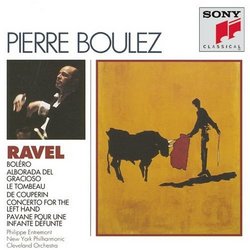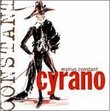| All Artists: Maurice Ravel, Pierre Boulez, New York Philharmonic, Camerata Singers, Philippe Entremont Title: Ravel: The Orchestral Works Members Wishing: 1 Total Copies: 0 Label: Sony Release Date: 1/14/1991 Genre: Classical Styles: Ballets & Dances, Ballets, Forms & Genres, Concertos, Historical Periods, Modern, 20th, & 21st Century Number of Discs: 3 SwapaCD Credits: 3 UPCs: 074644584226, 5099704584225, 007464458422 |
Search - Maurice Ravel, Pierre Boulez, New York Philharmonic :: Ravel: The Orchestral Works
 | Maurice Ravel, Pierre Boulez, New York Philharmonic Ravel: The Orchestral Works Genre: Classical |
Larger Image |
CD DetailsSimilar CDs |
CD ReviewsRavel in a new dimension Mr. Ian George Fraser | Brazil | 02/29/2008 (5 out of 5 stars) "As yet there is no complete recording of all the works of Maurice Ravel. There will be one day I am sure, as his music is so generally loved and appreciated by concert goers all over the world, it surely deserves it. In the meantime we have to be content with selections and in this respect the one made by Columbia.records and conductor Pierre Boulez must rank as one of the finest, covering almost the entire and considerable range of Ravel's orchestral music. Please forgive me for not reviewing every single piece on this very substantial collection, though I will do my best, as there are no program notes in this box set - almost my only quibble about it. Classical music is generally reckoned to possess five outstanding ballet scores: Tchaikovsky's Swan Lake and Nutcracker and Stravinsky's Firebird, Petrushka and The Rite of Spring. Thank to the genius of Pierre Boulez and the Berlin Philharmonic we are now able to add a sixth: Ravel's Daphnis and Chloe. Although the name Daphnis and Chloe will not be unfamiliar to most classical music lovers, thanks to its mesmerizing finale which is often played at concerts, only a handful will have heard have heard the ballet played in its entirety. This is a bit like knowing Beethoven's 9th symphony only from the final movement. Breathtaking though this movement is, up till now it has always lacked a context. Though the strange mixture of hedonism, classicism, eroticism and impressionism (too many -isms, I know) may at first seem quaint to the modern audience, this potently heady fin-de-siècle brew is still able to still intoxicate after more than a century. The story of the ballet, stripped of its somewhat pretentious classical superstructure is simple. Boy meets girl. Boy has problems dating girl. Boy seeks help from classical Gods. Whoosh! This is a lovely score in every sense of the word, full of mystique and refinement and for anyone who thinks modern life gritty and mean, the perfect antidote. Imitation is said to be the sincerest form of flattery and second record in the set begins with "Shéhérezade", Ravel's homage to the brilliant masterpiece by Rimsky-Korsakov of some forty years earlier. Although this piece has been compared unfavorably to its progenitor, the voice is authentic Ravel and in no sense completely imitative. This is an altogether more meditative, introspective view of the famous Arabian Nights myth, also Ravel's first completed full orchestral work There is no finer interpreter of 20th century French music than Pierre Boulez. He strips it of any last vestiges of German classicism and reduces it to a shimmering, evanescent nothingness that both bewilders and beguiles the senses. Nowhere is he better than in that masterpiece of faux espagnol, Ravel's famous "Rapsodie espagnole". I love to compare this piece with Manuel de Falla's equal sinuous and enticing "Nights in the Gardens of Spain". It is remarkable how many fine pieces were composed during this period on similar themes. I have to admit to not really liking "Valses Nobles et Sentimentales" until a friend took me to task by saying, as I liked so much else of Ravel, I was being rather unfair. "It is after all his own `Enigma Variations'" he said. Well my friend knew exactly how to hit a raw nerve, as I absolutely love the Elgar piece and whilst I still think the Ravel lacks the presence of a strong central character, that "Enigma" unquestionably has, his comment did help me a lot to see the fine individual character of the various waltzers. Last but not least on this second record is the "Mother Goose" ballet, which Boulez also records complete. This must be the ultimate piece of music written for children and this is a transporting performance which will take you a thousand leagues from the real world and back into the wonderful innocence of childhood. The finale, "Fairy Garden", will dispel any evil thoughts you had about the existence of such magical creatures. They live in a parallel universe only to be found on this record. The highlight of the third record is the unique and massively virtuosic Piano Concerto for the Left Hand composed in 1930 for the pianist, Paul Wittgenstein, who lost his right hand during the First World War. There is nothing else in music like this work. At once a scathing indictment of the cruelty and senselessness of war and laced with grim humor, it is also a towering tribute to man's ability to triumph over suffering and adversity. I wondered why Boulez chose this rather than the much more open, relaxed and comfortingly nostalgic G major Concerto which preceded this piece. It didn't seem obvious Boulez territory. It took Ravel ten years (he was an active combatant) before he could face the horror of WWI. At first it seems a return to Brahms - surely Ravel needed an emotional crutch before tackling such difficult subject matter, and where better to look for one, but the subsequent movements are full of deep and wounding irony, and terrible satire. I simply cannot understand those who say this is a minor piece. To me it is a raw, passionate and angry work that juxtaposes German romanticism ( yes, the enemy) with jazz, with Couperin, with Stravinsky, with...as I said this a unique piece and one which confirms Ravel as a composer of the very highest order. Here we are a world away from the salon, dandyism and refinement. This towering piece is certainly not for pure, technical playing, although technique is absolutely needed, and I was interested to see how Boulez would handle such an emotionally loaded work. I am pleased to say he abandons all his modernist prejudices and slams into it with all the passion it absolutely needs. Forced to make the choice, once more he made the right one - wonderful playing by Philippe Egremont. A second highlight is that ultimate exercise in pastiche, "The Tomb of Couperin". It's really difficult to describe this piece to anyone who hasn't heard it, but it belongs to a special group of works that pay homage to great music of a past age, such as Tchaikovsky's Variations on a Rococo Theme and Grieg's Holberg Suite. More than anyone I think, however, Ravel recaptures the loving but still happy nostalgia for the past which is so much part of all of his great music. More than any other composer, and I include here Michael Tippett in his superb Sinfonia Concertante on themes of Henry Purcell, a work surely inspired by this Ravel, he has the gift of "translating" into a modern idiom the music of a remote period, the French rococo. This is music at its purest and highest level. I think Boulez in the finale, Rigaudon, is just a little too fast, but the preceding dreamy Minuet is pure inspiration. There are also some delightful miniatures such as Alborada del Gracioso , Une Barque sur l'Océan , Fanfare for "Jeanne's Fan" and Pavane for a Dead Infanta and also the famous raunchy Bolero, though I thought this was the least successful of the pieces in the set - way too cool and sophisticated.... For me at any rate the real treasure of this set is kept till last. Probably, like me, for most the world of French chanson is not the most familiar ground. I certainly least expected it to be in Boulez' repertoire. Just shows you, never take anything for granted. The French poet Stephane Mallarmé and Ravel seem to be natural partners. The former's dreamy and occasionally obscure symbolism with its nostalgic longings towards a distant classical past and more than a faint hint of repressed sexuality combine superbly with Ravel in his impressionist style and he rewards these texts with some of the most advanced, almost atonal harmonies, he ever wrote. This is of course just meat and drink to Boulez and he guides us through these challenging pieces with a sure hand. Equally Murand's lightly satirical Don Quichotte à Dulcinée is absolutely perfect nutrition for Ravel in his Spanish mood and these songs tread the fine line between romanticism and pastiche absolutely perfectly. The real surprises are the Chansons Madecasses by de Parny and the Five Greek Folk Songs by Calvocoressi. At first sight the heady, exotic eroticism of the Madagascan songs seems a bit of a stretch for Ravel and the second of these, an extraordinary war song which offers a potted history of colonialism from the black point of view, right off the chart. But Ravel is always full of surprises and amazingly I think he brings this off. It's certainly, whatever you else you might think, unlike anything else he ever wrote. Jessye Norman incidentally, with her rich, heavy Southern voice, is the perfect singer for these outrageously amazing songs. Finally, did you ever wonder where Joseph Canteloube got his idea for the incomparable Songs of the Auvergne from? Listen to the Five Greek Folk Songs by Ravel and I think you will have your answer. This is an absolute gem of a collection and one that must be appreciated by any lover of Ravel's music. It will not leave you satisfied, as there are no chamber works and no true lover of Ravel could be without the String Quartet or the Piano Trio in A minor. There is also no room for the glittering G major Piano Concerto, so different in character from the one recorded here, but it does nevertheless represent a genuine cross section of his work and no-one who listens to it can be left in any doubt as to Ravel's true status within the classical pantheon as a composer of the very highest stature. Maître Boulez deserves the highest praise for a wonderful compilation of a wide range of recordings made at very different times with a considerable number of different orchestras. His programming is faultless and the combination of works on Disc 3 in particular almost creates an entire new "superwork". Ravelissimo! " Fabulous set! Hiram Gomez Pardo | Valencia, Venezuela | 10/12/2005 (5 out of 5 stars) "In the Apollonian personality of Boulez Ravel is revealed from another perspective. His Ravel is far to be a pleasant and delicate composer to reveal the bitterness beneath the score. I like this approach because not only gives some interesting clues about the relevance of certain dismissed works such as La Valse, for instance.
In Scherezade Boulez makes a mythical journey that recalls us so much the similar vision concerned with Daphne and Cloé, where the unconscious side of the story seems to reflect menacing shadows and twilight echoes of missed visions in a supra rational world His Valses Nobles and Sentimentales confirm the evidence; are played with emotion but without sentiment. Rapsodie espagnole is one of the best registers triumphs, brilliant and concise. Pavana is egregious. Le tombeau de Couperin was played with magisterial phrasing . The Concert for the left hand finds Entremont in one of his best days. In what Daphne and Cloe concerns there is a name: Charles Munch and the unbeatable version of the Fifties with the Boston Symphony. Captivating and engaging approach. Go for this record because when a composer-director with the admirable musical maturity of Boulez, something new happens, because the baton becomes scalpel. " |




